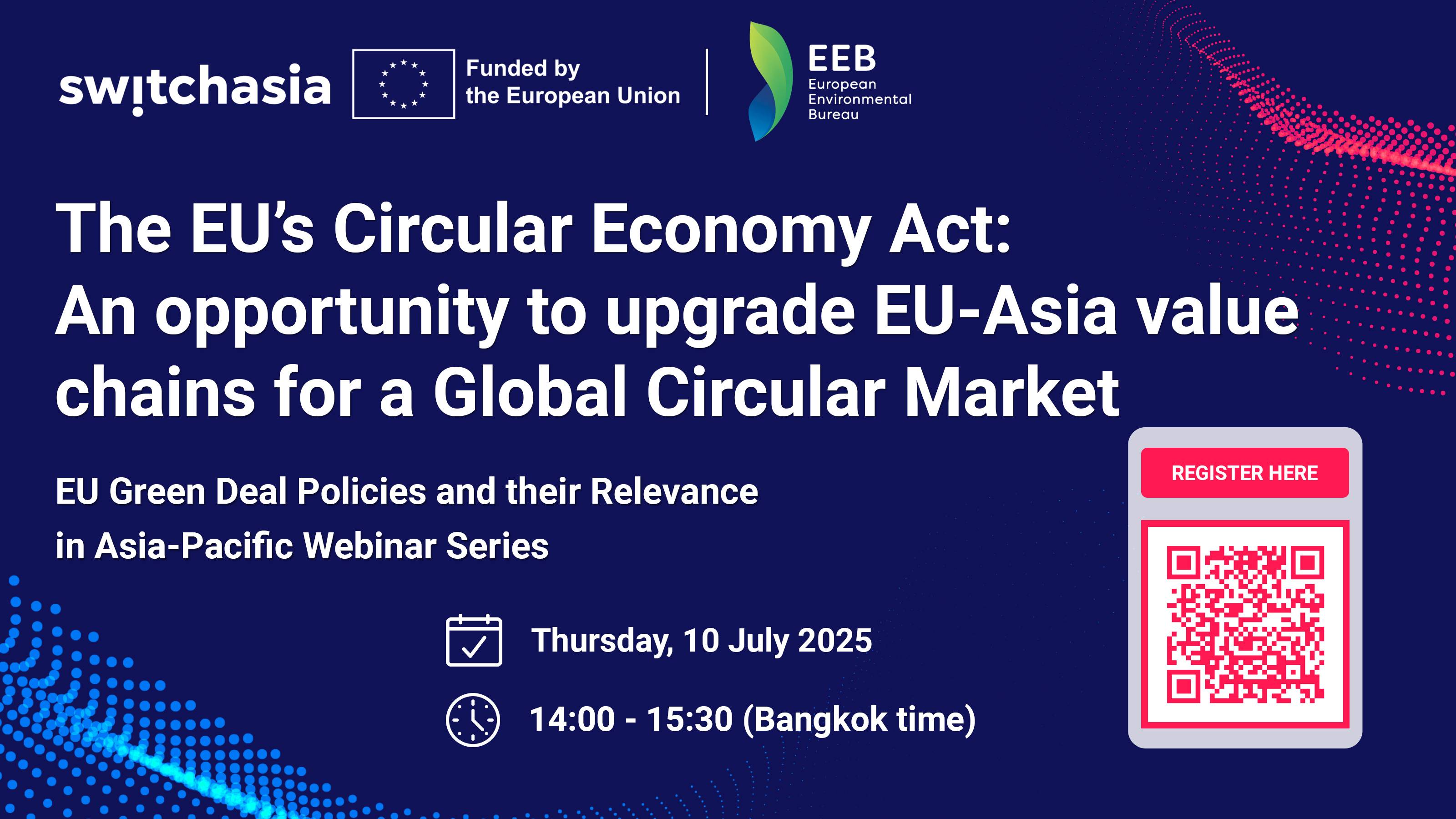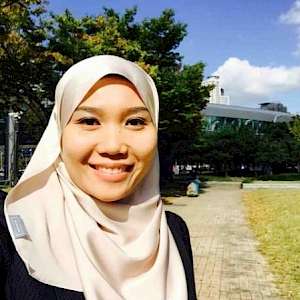
WHEN: 10 July 2025 I TIME: 14:00 - 15:30 (Bangkok Time) I Watch the recording HERE
Background:
The EU Circular Economy Act, expected to be published in 2026, aims to reshape how industries use resources, reduce waste, and compete globally. It builds upon the 2020 EU Circular Economy Action Plan, with the goal of boosting recycling, reducing waste, and promoting resource efficiency. The Act will focus on the entire lifecycle of products, from design to end-of-life, and aims to create a single market for waste, particularly for critical raw materials. A key priority of the EU Circular Economy Act will be harmonising circular economy policies across Member States, reducing regulatory fragmentation and simplifying legislation. This will create a level playing field where both start-ups and established businesses can grow and thrive. The Act will also focus on accelerating investment in circular infrastructure, such as recycling facilities and material recovery systems. More concretely, the Act is expected to introduce measures that incentivise the use of secondary materials in manufacturing, helping to close the loop on resource use. Bringing circularity even more into play, businesses will need to rethink their product designs and suppliers. For instance, the EU Circular Economy Act is expected to align with existing regulations like the Packaging and Packaging Waste Regulation (PPWR), which mandates that all packaging must be reusable or recyclable by 2030. As a result, key sectors such as packaging, electronics, chemicals, construction, transportation, and textiles will be affected by the EU Circular Economy Act.
The Circular Economy Act presents an opportunity to build EU-Asia partnerships that will shape value chains globally for a more Circular Global market. With the opening of consultations about the Circular Economy Act in July, Asian partners can seize the opportunity to share their own policy ambitions for a Global Circular Market. The circular economy approach promotes the use of secondary raw materials, minimises environmental impacts associated with extraction and may increase the need for reliable partnerships that are foundation for active exchanges.
Webinar Session:
The EU SWITCH-Asia Policy Support Component and the European Environmental Bureau, are convening the webinar, The EU’s Circular Economy Act: an opportunity to upgrade EU-Asia value chains for a Global Circular Market to:
-
Discuss the EU Circular Economy Act and how it may re-shape EU-Asian value chains and create a Global Circular Market
-
Understand how Europe can build its Circular Economy Act for strengthened EU-Asian value chains.
-
Discuss the challenges and opportunities for businesses in navigating this transition and how the Circular Economy Act can offer new horizons to its partners
Speakers
 Eva BILLE, Head of Circular Economy, European Environment Bureau
Eva BILLE, Head of Circular Economy, European Environment Bureau
Eva is in charge of the EEB activities around circular economy policy. She studied economics and graduated with a Master’s Degree specialising in resources, development and growth from Tilburg University. She has previously spent 10+ years as an EU policy consultant, working with major companies and trade associations in the Brussels bubble. She has also worked for the UN in Lebanon and spent 4 years working in China.
 Rasmus NORDQVIST, Member of the European Parliament
Rasmus NORDQVIST, Member of the European Parliament
Rasmus Nordqvist joined the European Parliament in 2024, following two terms in the Danish national parliament and a long career in the fashion industry. Having witnessed no progress in how the fashion and textile sectors use the planet’s resources, he is now dedicated to driving tangible change. During his time in the Danish parliament, he played a key role in negotiating the Danish Climate Act. Today, his efforts center on promoting a circular economy—particularly within the fashion and textile industries. He actively engages with stakeholders to gather insights from the sector, aiming to influence the European Commission’s forthcoming Circular Economy Act, set to be presented in late 2026.
 Karolina D’CUNHA, Head of Unit, Competitive Circular Economy and Clean Industrial Policy, DG Environment
Karolina D’CUNHA, Head of Unit, Competitive Circular Economy and Clean Industrial Policy, DG Environment
Karolina D’Cunha works for the European Commission’s Directorate General Environment as Head of Unit “From Waste to Resources”. She has over eleven years’ experience on the development, adoption, and implementation of the European waste management policies and laws. Previously to her current position, she was responsible for natural capital & ecosystem health where she coordinated the drafting and adoption of the EU Biodiversity Strategy for 2030 and its subsequent implementation and was part of the team negotiating a new Law on nature restoration. Karolina had also worked on Circular Economy and various aspects of sustainable production and consumption, including the elaboration of the Commission’s Circular Economy Action Plan, the Plastics Strategy, and a new Directive restricting the use of certain single-use plastic items.
 Latifahaida LATIF, Assistant Director for Analysis and Monitoring on Finance and Socio-Economic Issues, ASEAN Secretariat
Latifahaida LATIF, Assistant Director for Analysis and Monitoring on Finance and Socio-Economic Issues, ASEAN Secretariat
Latifahaida is an international trade negotiator specialising in the financial sector. She joins the ASEAN Secretariat as Assistant Director responsible for the analysis and monitoring of finance and socioeconomic issues which include sustainability agenda for the ASEAN Economic Community. Prior to this, Latifahaida was a Trade and Commercial Advisor with the British High Commission, Kuala Lumpur; Deputy Director of International Department at Bank Negara Malaysia; and Assistant Director at the Ministry of International Trade and Industry, Malaysia.
 Zaki ZAMAN, UNIDO Country Representative in Bangladesh
Zaki ZAMAN, UNIDO Country Representative in Bangladesh
Mr. Zaman, a national of Bangladesh, was appointed as Country Representative of UNIDO in Bangladesh from May 2017. Prior to his appointment, he worked as Head of UNIDO Operations in Bangladesh from 2010 to April 2017. Before joining UNIDO, Mr. Zaman worked for the International Finance Corporation (IFC), the private sector arm of the World Bank Group, where he developed the agribusiness programme for IFC advisory component. Throughout his career, Mr. Zaman has been involved in inter-agency collaboration with UN sister organizations and international and national NGOs. Mr. Zaman completed his undergraduate studies and an M. Sc in Agricultural Economics from Bangladesh Agricultural University, Mymensingh. He also completed a master’s and PhD in Agricultural Marketing from Hokkaido University, Japan.
Agenda
|
10 July 2025 |
|
|
14:00 |
Introduction to the Webinar
|
|
14:05 |
Presentation: EU Circular Economy Act
|
|
14:20 |
Panel Discussion: EU Circular Economy Act - An opportunity to upgrade EU-Asia value chains for a Global Circular Market
Moderated by Elodie MARIA-SUBE, Key Expert on EU policy development and partnership building, SWITCH-Asia Policy Support Component |
|
15:00 |
Q&A |
|
15:25 |
Concluding Remarks and Next Steps
|


